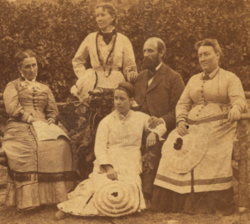 | |
| Other short titles | Anti-Plural Marriage Act of 1882 |
|---|---|
| Long title | An Act to amend section fifty-three hundred and fifty-two of the Revised Statutes of the United States, in reference to bigamy, and for other purposes. |
| Nicknames | Anti-Polygamy Act of 1882 |
| Enacted by | the 47th United States Congress |
| Effective | March 22, 1882 |
| Citations | |
| Public law | 47-47 |
| Statutes at Large | 22 Stat. 30b |
| Legislative history | |
| |
| Mormonism and polygamy |
|---|
 |
|
|
The Edmunds Act, also known as the Edmunds Anti-Polygamy Act of 1882,[1] is a United States federal statute, signed into law on March 23, 1882 by President Chester A. Arthur, declaring polygamy a felony in federal territories, punishable by "a fine of not more than five hundred dollars and by imprisonment for a term of not more than five years".[2] The act is named for U.S. Senator George F. Edmunds of Vermont. The Edmunds Act also prohibited "bigamous" or "unlawful cohabitation" (a misdemeanor),[3] thus removing the need to prove that actual marriages had occurred.[1] The act not only reinforced the 1862 Morrill Anti-Bigamy Act but also made the offense of unlawful cohabitation much easier to prove than polygamy misdemeanor and made it illegal for polygamists or cohabitants to vote, hold public office, or serve on juries in federal territories.[4]
A claim was made that the law violated the constitutional prohibition on ex post facto laws; that is, polygamists were charged for polygamist marriages solemnized before the passage of the statute. A challenge to the statute was framed on these and other grounds. The Supreme Court ruled, in Murphy v. Ramsey, 114 U.S. 15 (1885), that the statute was not ex post facto because convicts were charged for their continued cohabitation, not for the prior illegal marriage.[5] Some modern scholars suggest the law may be unconstitutional for violating the Free Exercise Clause.[6]
The Edmunds Act restrictions were enforced regardless of whether an individual was actually practicing polygamy, or merely stated a belief in the doctrine of the Church of Jesus Christ of Latter-day Saints (LDS Church) on plural marriage without actually participating. It also provided for a five-man Utah Commission appointed by the president to supervise all aspects of the electoral process in Utah Territory.[4] All elected offices throughout the territory were vacated; the election board issued certificates to candidates who both denied a belief in polygamy and did not practice it; and new elections were held.
Enforcement of the acts started in July 1887. The issue went to the U.S. Supreme Court in the case Late Corp. of the Church of Jesus Christ of Latter-Day Saints v. United States, which upheld the Edmunds–Tucker Act on May 19, 1890. Among other things, the act disincorporated the LDS Church. Within five months, the LDS Church officially discontinued the practice of plural marriage with the 1890 Manifesto. On October 25, 1893, a congressional resolution authorized the release of assets seized from the LDS Church because, "said the church has discontinued the practice of polygamy and no longer encourages or gives countenance to any manner of practices in violation of law, or contrary to good morals or public policy."[7]
- ^ a b U.S.History.com, Edmunds Anti-Polygamy Act of 1882.
- ^ ""The Edmunds Act"" (PDF). Library of Congress. 1882
- ^ About Mormons, Anti-Polygamy Legislation. Accessed 2008.03.26.
- ^ a b Thatcher, Linda (ed.). "Struggle For Statehood Chronology". State of Utah. Archived from the original on April 20, 2016. Retrieved February 15, 2017.
- ^ See also "The Anti-Polygamy Law; Its Constitutionality Upheld by the Supreme Court", The New York Times, March 24, 1885, p. 3.
- ^ Vazquez, Richard A. (Fall 2001), "The Practice of Polygamy: Legitimate Free Exercise of Religion or Legitimate Public Menace? Revising Reynolds in Light of Modern Constitutional Jurisprudence" (PDF), New York University Journal of Legislation and Public Policy, 5 (1), New York University School of Law: 225–253, archived from the original (PDF) on 2014-02-28, retrieved 2014-02-24
- ^ Jt. Res 11., 53d Cong., 1st Sess., 28 Stat. 980
© MMXXIII Rich X Search. We shall prevail. All rights reserved. Rich X Search
